With over ten million residents, the state of North Carolina is the ninth largest state by population. Historically, it was the first state in America to launch a public university (UNC) back in 1795. In terms of community colleges, the state boasts around five dozen schools across the state. Community colleges are public higher education institutions that traditionally have provided less than two-year undergraduate education opportunities to students via degree pathways and certificate programs. That being said, there are a handful of community colleges experimenting with three and four-year degree pathways to students.
2025 Best Community Colleges in North Carolina
Pamlico Community College, located in coastal Pamlico County, North Carolina, is the right choice for you if you are looking for accessible and affordable quality education, training and lifelong learning opportunities through quality teaching. With this as their mission, they strive to educate and support you and ensure that the college is an enriching and productive experience for you.
Founded in 1962, as an industrial education center, this college offers a wide variety of programs in varied disciplines such as Allied Health, Arts and Sciences, Business Technologies, Cosmetology, General Occupational Technology, Horticulture and Welding Technology. You can get details of the programs from their website. They also offer Distance learning programs. If you can connect to the internet you can earn college credits! Distance learning courses meet the standards established by the North Carolina Community College System and are accepted as part of the graduation requirement for an approved degree, diploma or certificate.
PCC is accredited with the Southern Association of Colleges and Schools Commission on Colleges to award Associate Degrees, Diplomas and Certificates.
Education does not come easily and it requires investment of your efforts, your time and your resources. If you need assistance in terms of finance, PCC is there to counsel you and help you to be able to attend college.
To help you achieve your educational as well as career goals, PCC provides support through different student services. They also have a Student Success Center that provides tutoring by experienced tutors in English and Math. A Small Business Center provides free and confidential counseling for businesses that are new or existing.
With the varied disciplines offered in education and with all the student services to take advantage of this college is a good choice to start your first step towards achieving your education and career goals.
Enrollment
527
Student to Faculty Ratio
9:1
Sampson Community College, located in Clinton, North Carolina, and is a member of the North Carolina Community College System and adheres to the policy that post secondary education should be available throughout the state in the form of open door which allows any student to enter and enroll. The school operates with the intention of providing as many opportunities and as much assistance as possible for its students to ensure that their needs and goals academically, personally and or professionally are met.
Academics
As a comprehensive community college, SCC offers students a variety of programs aimed at workforce development or academic transfer. Workforce development is achieved through programs that provide career and technical training, allowing students to enter the work force upon completion of a one to two year program, and seek employment with a certificate or degree that demonstrates competency. Academic transfer programs allow students to complete the first two years of a four year education, followed by applying for transfer to a four year institution to complete the final two years and earn a bachelor's degree.
Programs offered include:
Admissions and Financial Aid
Sampson Community College is an open enrollment institution that allows any individual that completes the application, pays the fees, and provides transcripts to enroll. Students may be required to take a placement exam prior to registration, and are also encouraged to meet with a counselor and participate in new student orientation. Financial aid is available in the form of loans, grants and scholarships and is awarded based on need as determined by the applicant's Free Application for Federal Student Aid (FAFSA).
Enrollment
1,293
Student to Faculty Ratio
10:1
Montgomery Community College has an open-door admission policy and it provides vast learning opportunities through traditional and distance education. This college is previously named as Montgomery Technical Institute and Montgomery Technical College. Its campus facility is approximately 134,400 square feet and it occupies 153 acres of land at 1011 Page Street, Troy, NC 27371. This college fosters an environment for lifelong learning and educational excellence. It offers distinct courses and trainings in both curriculum and continuing education programs. Some of its unique programs are Human Services Technology: Developmental Disabilities, Shooting and Hunting Sports Management, Forest Management Technology and the Professional Crafts: Clay degree program. Montgomery Continuing Education program includes the following: Career and College Readiness, Adult Basic Education (ABE), Adult High School (AHS), General Education Development (GED) and English as a Second Language (ESL). At Montgomery, students are also given the opportunity to relax and have fun with several activities sponsored by the Student Government Association such as the Spring Fling, Polar Volleyball, Hollywood Spooktacular and Holiday Feast held once every year. Change is the main driving force of positive transformation for Montgomery, its students and the community it serves. This college strives to continuously enhance its programs to maintain high quality education and meet the evolving needs of the citizens.
Enrollment
836
Student to Faculty Ratio
8:1
Brunswick Community College, located in Bolivia, North Carolina, was founded in 1979 to provide educational opportunities for residents of the area and was originally know as Brunswick Technical Institute. The school changed its name within half a year to Brunswick Technical College, and once again in 1988 to its current name, reflecting changes regarding two year institutions throughout the state. Brunswick Community College is a public institution and member of the North Carolina Community College System which operates institutions offering similar academic and career opportunities throughout the state.
Academics
Brunswick Community College offers a variety of programs that allow for career or transfer opportunities. Career training programs provide students the skills and knowledge necessary for a career in a given technical or vocational field, allowing entry into the workforce as a professional immediately after graduation. Career programs take between one and two years to complete and result in a certificate or associate degree. Academic transfer programs allow students to complete the first two years of a four year education, followed by transfer to a four year institution to complete their bachelor's degree. Transfer is facilitated by agreements between the college and state operated public institutions, though transfer is possible to out of state and private schools.
Programs offered include:
Admissions and Financial Aid
As an open enrollment institution, any students who meet the minimum requirements for admissions will be enrolled after completing the application for admission and submitting it to the school. Students should submit transcripts and test scores along with the application, and are required to take a placement exam prior to the registration, which takes place prior to the start of each semester.
Financial aid is available in the form of loans, grants and scholarships. Students in need of financial aid must obtain a federal PIN as well as submit a Free Application for Federal Student Aid (FAFSA), which will be used to determine need, eligibility and awards. Financial aid must be reapplied for prior to the start of the academic school year and students may be asked to provide additional financial information to ensure the accuracy of the FAFSA prior to the disbursement of funds.
Enrollment
1,482
Student to Faculty Ratio
9:1
Southwestern Community College is a two-year postsecondary educational institution operating in the North Carolina Community College System. With a vision to provide a gateway for enriching lives and broadening horizons, the Southwestern Community College acts as guiding force in growing and caring for the community.
Southwestern Community College was established in 1964, in Sylva as the Jackson County Industrial Education Center. It provides instruction in more than 60 programs and awards Certificates, Diplomas and Associate Degrees for its various programs. Every year over 2500 students enroll for credit courses and over 5500 students enroll for other courses, workshops or seminars offered through Continuing Education. The college has opened a new Macon campus and also operates in 4 other centers that are located in Bryson City, Franklin and Cashiers.
The College campus has resource-rich, state of the art facility with computer laboratories and interactive classrooms. Some of the curriculum programs they offer are - Business Administration, Civil Engineering Technology, Computer Information Technology, Health Information Technology, Real Estate, Networking and Web Technology.
Continuing Education classes are available in the areas of Arts and Crafts, Business and Industry Training, Nursing and Small Business Center Courses.
The College is accredited by the Commission on Colleges of the Southern Association of Colleges and Schools to award Associate’s degrees.
So if you want to continue your educational journey, enhance your career skills or transfer to a four-year degree college, SCC is the right choice for you. SCC is committed to provide you with a curriculum that will challenge you and cultivate your skills to better your future.Enrollment
2,366
Student to Faculty Ratio
13:1
For more than four decades, Mayland Community College has been serving the residents of Mitchell, Avery, and Yancey counties with its main campus located at 200 Mayland Drive Spruce Pine, NC 28777. This college has low tuition rate. The cost per credit hour for in-state students is $71.50 which is about $2288 per year and students can also avail of scholarships and financial aid opportunities.
Committed to providing quality education, this college utilize the latest technology and provides hands-on experience to the students as preparation for higher education or professional career. At present, there are 35 curriculums for technical, vocational and transfer programs. It offers Associate Degree in Nursing, Nursing Assistant and Medical Assisting.
As part of the North Carolina Community College System, Mayland Community College partner with other institutions to easily facilitate college transfer. It has also established transfer agreements to regional institutions specifically in schools under the UNC system.
Mayland Community College prides itself as the intelligent choice in starting a higher educational pursuit as their students are guided in developing their own success plan. The small class size allows focus on the learning of each student. Besides academic excellence, this college values lifelong learning and leadership. Students are given the opportunity to become leaders as student ambassador or as part of the student government. Moreover, numerous support services accessible to the students are designed to enhance their learning and enrich their campus experience.
Admissions http://admissions.mayland.edu/
Enrollment
1,082
Student to Faculty Ratio
13:1
Randolph Community College, located in Asheboro, North Carolina, was founded in 1962 as a joint city-county education center known as the Randolph Industrial Education Center. The Randolph Industrial Education Center joined the North Carolina Community College System in 1963, shortly after the founding of the system. The school is situated in the center of North Carolina and serves a population of over 140,000 countywide.
Academics
Randolph Community College offers a wide variety of programs and majors that lead to either or certificates or degrees. Vocational programs are geared toward preparing individuals for work post-graduation while transfer programs are designed to assist students in pursuing higher education at a four year institution. RCC also offers continuing education courses as well as adult education programs.
Programs offered include:
Admissions and Financial Aid
Enrollment at Randolph Community College requires a high school diploma or GED. Applicants should complete and submit the application along with transcripts or official test scores. Once received, applicants should take a placement exam and familiarize themselves with the campus. Students will begin registration t orientation.
‘
Students wishing to apply for financial aid should complete and submit the Free Application for Federal Student Aid (FAFSA) and apply for a PIN. The applicant will receive a Student Aid Report (SAR), which will determine which forms of aid the student is eligible for.
Enrollment
2,784
Student to Faculty Ratio
11:1
About
Wayne Community College, located in Goldsboro, North Carolina, was founded in 1957 as the Goldsboro Industrial Education Center with all students being part time students until 1962. Full time courses were originally offered in drafting, auto mechanics, electronics and nursing. Over the next few years additional locations were opened, expanding the school's service area. In 1964 the school was renamed Wayne Technical Institute, and three years later became Wayne Community College to represent its new focus and mission and growing importance and role in the community. The school is one of the many that comprise the North Carolina Community College System and maintains a steady growth rate in enrollment.
Academics
As a comprehensive community college the school offers a variety of programs and services that allow for academic transfer or career training. Academic transfer programs allow students to complete the first two years of a four year education at WCC followed by transfer to a four year college or university to complete the final two years and earn their bachelor's degree. Career training programs provide an education in a specific industry or field that allows the student to enter the workforce as a qualified professional upon completion. Such programs take between one and two years to complete and confer a degree or certificate upon completion.
Programs offered include:
Admissions and Financial Aid
Any student interested in enrollment at WCC may enter by completing the application for admission and paying the associated fees. Students are encouraged to supply previous transcripts and test scores, and may be required to take a placement exam prior to registration. Financial aid is available in the form of loans and grants and distributed based on need as determined by the information provided by the student on their Free Application for Federal Student Aid (FAFSA). Aid must be applied for prior to each academic year.
Enrollment
3,238
Student to Faculty Ratio
12:1
Stanly Community College, located in Albemarle, North Carolina, was established in 1971 through a temporary location on the Albemarle High School Campus. The school originally focused primarily on career development, and as a result saw rapid increase in enrollment within only five months of operation. This increase resulted in the establishment of a permanent campus, after which the college grew in scope, size, and offerings. The school is part of the North Carolina Community College System which governs and operates all 58 community colleges in the state.
Academics
As a comprehensive community college, SCC offers a variety of programs geared at workforce development or academic transfer. Workforce development is achieved through programs that provide education and training in a variety of high demand fields in order for the student to enter given field or industry as a professional upon completion. Such programs take between one and two years to complete, resulting in a certificate or associate's degree. Academic transfer is accomplished by taking on a curriculum that mirrors the first two years of a four year education, after which the student will apply for transfer to a college or university to complete the final two years and earn a bachelor's degree.
Programs offered include:
Admissions and Financial Aid
Students wishing to enroll may do so through the completion and submission of an application for admission and the payment of all accrued fees. Students should also supply transcripts and test scored, as well as take a placement exam if necessary prior to registration. A meeting with a counselor is encouraged to discuss program enrollment and curriculum. Financial aid is offered in the form of loans, grants and scholarships and is awarded based on need. The information provided through a student's completed Free Application for Federal Student Aid (FAFSA) will be used to determine the extent of one's need and their aid program eligibility.
Enrollment
2,545
Student to Faculty Ratio
13:1
About Edgecombe Community College, located in Tarboro, North Carolina, is one of the 58 community colleges that comprise the North Carolina Community College System. Originally formed as an extension of Wilson County Technical Institute in 1967, Edgecombe Community College officially became its own entity in 1971, and changed its name from Edgecombe Technical Institute to the current in 1997.
Since its founding the school has grown, adding a second campus, and expanding its service area. Enrollment has increased steadily over the years as well, and as a result additional programs and facilities have been added over time to meet growing needs.
Academics
Edgecombe Community College offers a variety of programs designed to assist students in meeting their academic or professional goals. Students pursuing career training will earn of the course of one or two years, a certificate or degree the demonstrates competency in their area of study and allow for admissions into the workforce at the entry level. Such programs provide students with the skills and knowledge necessary to become professionals.
Academic transfer programs are also available, allowing students to complete the first two years of a four year education at low monetary cost. Students may apply for transfer to a college or university upon completion, continuing their education toward a bachelors degree upon admission.
As admission requirements vary for transfer will vary by institution, it is recommended students meet with a counselor to develop a curriculum that best meets the requirements of the desired school or schools of transfer.
Programs offered include:
In addition to normal academic and career offerings, Edgecombe Community College offers a number of continuing education courses that allow professionals to refresh their knowledge. This is beneficial for those who require an update to their education, particularly for the renewal of licenses or certificates as required by local or state government.
Admissions and Financial Aid
As an open enrollment institution, students who meet the minimum requirements for enrollment will be admitted upon submission of the application for admission. Students must have a high school diploma or be eighteen years of age to enroll. Students must provide transcripts and take a placement exam prior to registration, which takes place shortly prior to the start of each semester.
Financial aid is available in the form of loans, grants and scholarships. Students in need of financial assistance must complete the Free Application for Federal Student Aid (FAFSA), the information provided by which will be used to determine financial need, aid program eligibility, and monetary awards. Students may be asked to provide additional financial information prior to the disbursement of funds. Financial aid must be reapplied for at the start of each academic year.
Enrollment
2,012
Student to Faculty Ratio
15:1
Western Piedmont Community College, located in foothills of Morganton, North Carolina, is a good place to start your educational journey if you want to earn an associate degree or a diploma. They also meet your needs to learn a new skill that will help you get a better job. Once you complete your first two years of college here, Western Piedmont Community College will help you to transfer to a four year institution. With a mission to provide accessible high quality education that improves lives and promotes growth, WPCC aims to develop the potential of every student through the innovative learning strategies and student services that they offer. WPCC is accredited by the Southern Association of Colleges and Schools Commission on Colleges to award associate degrees. They offer certificate trainings programs in various disciplines such as law enforcement, fire and rescue training and health services. To meet the challenges of the changing workplace today, you can take up the interactive instructor led classes or the online courses to enhance your skills or learn new ones. These courses have flexible scheduling and are structured to accommodate your busy lifestyle. The college also offers distance learning services where you receive your assignments and instructions through the Blackboard course management system. The committed faculty and staff are dedicated to working with you to achieve your goals, so if you want to earn an associate degree or diploma or learn specific skill to get a job, this is right place for you.
Enrollment
1,779
Student to Faculty Ratio
10:1
Southeastern Community College also known as SCC is a public community college that provides accessible educational, cultural and social opportunities for you. They can help you meet your educational needs with the help of their exceptional faculty and student centered learning environment. In SCC you can prepare for a successful transfer to a college or university, gain skills to start a new career or upgrade your existing skills. SCC is committed to making higher education accessible and achievable to all by adopting traditional delivery methods as well as non-traditional methods by using the Internet, conducting night classes and distance learning methods. Your active participation and persistence in the learning process would decide your success at SCC. SCC was founded in 1964 and is accredited by the Commission on Colleges of the Southern Association of Colleges and Schools to award certificates, associate degrees and diplomas. SCC offers a wide variety of college credit programs and continuing education courses. Some of their unique programs include American Sign Language, Broadcasting and Production Technology Program, Fine Arts Program in Art and Music and First Agricultural Biotechnology Associate Degree Program. These are just few programs and a complete list of programs offered by them can be obtained from their website - http://www.sccnc.edu/ProgramsCourses.aspx SCC also offers you with counseling services, individualized tutoring services and disability services. At SCC, learning does not stop when you leave the classroom. There are a variety of opportunities for you to achieve your academic, career and personal goals. Various workshops in Leadership skills, mentoring programs, fellowships and community activities are offered, which you can explore.
Enrollment
1,448
Student to Faculty Ratio
9:1
Haywood Community College is known for its unique programs and distinct main campus designated as an arboretum. It started in 1965 as the Haywood Industrial Education Center with only one curriculum and few students.
The main campus located in Clyde, NC is a home for lofty oak trees and magnificent gardens. It is highly regarded for the Rhododendron and Dahlia Gardens that serves as an attraction for green area clubs and the local residents.
HCC aims to promote community development through providing quality education that meets the diverse needs of the population. At present, HCC serves thousands of students and offers more than 50 curriculum programs. Among these curriculum programs, 9 associate degrees, 3 diplomas, and 9 certificates can be accessed online.
Several non-curriculum programs under the Continuing Education division are also available. These include Adult Basic Education, GED preparation, occupational courses, and community service trainings.
Unique programs of HCC such as the Fish and Wildlife Management and Low Impact Development associate degree which are the only courses of its kind in the whole state; and the Forest Management Technology associate degree program which is the only one accredited by the Society of American Foresters fall under the Department of Natural Resources
Aside from academic excellence, HCC also cultivates student leadership and community participation to augment student’s educational experience by providing wide array of activities on campus.
Programs of Study http://www.haywood.edu/programs_of_study
Prospective Student's Guidehttp://www.haywood.edu/prospective_students
Enrollment
1,627
Student to Faculty Ratio
13:1
Cleveland Community College is a public comprehensive community college at Shelby, Cleveland County, North Carolina. This college is accredited by the Southern Association of Colleges and Schools. Since its inception in 1965, CCC has been providing accessible, quality education and training vital to the needs of the community.
Consistent to its goal to build a better future, CCC provides vast learning opportunities for students to realize their hopes and aspirations. CCC programs and courses are designed to prepare the students for their academic and professional path.
This college is known for its competitive Allied Health programs including Associate Degree Nursing, Advanced Placement, Radiography, Practical Nursing, Surgical Technology, Medical Assisting, and Phlebotomy. Classes at CCC are small with an 11:1 faculty student ratio allowing more focus on each student.
Transfer programs provide initial credits for transfer to four-year institutions. Conversely, Diploma and Certificate courses equip students with the necessary vocational and technical competence to enter the workforce in the field of science, technology and engineering, among others.
Through the Blackboard, CCC's course management system, some of the courses are made available online to provide flexibility and meet the diverse needs of the students. Furthermore, in response to the changing business environment, continuing education which includes training programs are also offered to promote continuous skills development and career enhancement.
To enhance the college experience of the students, resources such as Student Success Center, Learning Center, Fitness Center, Rose Library and Student Clubs are made available on campus.
Registration http://clevelandcc.edu/index.php?page=registration-take-classes
Programs and Courses http://clevelandcc.edu/index.php?page=academics
Enrollment
2,551
Student to Faculty Ratio
11:1
Established primarily for the residents of North Carolina, Central Carolina Community College also serves as a higher educational resource for other states. It was formerly known as the Lee County Industrial Education Center. This college is a constituent of the North Carolina Community College System with campuses located at Chatham, Harnett, and Lee counties. The campus at Lee County is situated on a 104-acre site at 1100-1105 Kelly Drive in Sanford. This campus is a home for state-of-the-art facilities designed to provide an environment conducive to learning for the students. CCCC remains true to its vision to provide quality and accessible educational opportunities for the community it serves. This college offers 45 curriculum programs that conclude with an Associate degree or college transfer credits, Diploma and Certificate. To facilitate seamless transfer to four-year institutions, CCCC established articulation agreements with colleges and universities. Selected programs may be taken via online distance education. Through innovative programs and continuous improvement of its academic services, this college responds to the changing needs of the students and the community. Besides the curriculum courses, non- curriculum and Adult High School/GED programs are also offered. And with the Lee Early College program, students are given the opportunity to finish high school and Associate degree in five years in partnership with Lee County Public Schools. At CCCC, students can experience a true sense of community with a diverse population working towards a common goal - to achieve personal success, community development and economic progress.
Enrollment
5,190
Student to Faculty Ratio
14:1
Richmond Community College, also known as RCC, offers many options for high quality learning and training that is also convenient and accessible. Established in 1964 by the North Carolina Department of Community Colleges, in Hamlet, North Carolina, is an equal opportunity institution. Every year, RCC serves around 9100 students in various programs that they offer, including curriculum programs and the Workforce and Economic Development Programs. The Workforce and Economic Development Department offers programs ranging from GED to Basic Law Enforcement Training. There are a total of 61 degrees, diplomas and certificates that RCC offers.
So whether you are looking for a four year degree at a university or are interested in gaining the skills required in the 21st century for technical careers, RCC is a good place to start. Many courses in the programs offered by RCC transfer you to four year colleges or universities. You can complete these programs in 2 years if you are a full time student and then enter the workforce with marketable skills or transfer to a university for a bachelor’s degree. The diploma and certificate courses can be completed in a shorter time. The credit programs offered by RCC range from Accounting, Air Conditioning and Heating, Welding Technology, Associate in Arts or Science or General Education to Business Administration, Computer Technology and Electronics.
To make your learning experience enjoyable and successful, RCC offers a wide variety of services including admissions, exploring college majors, placement tests, financial assistance for tuition and library to assist you with research projects.
So with a mission to provide life-long educational opportunities, workforce training and cultural enrichment, RCC strives to help you achieve your educational goals and enhance your quality of life.
Enrollment
2,555
Student to Faculty Ratio
15:1
Carteret Community College, located in Morehead City, North Carolina, was founded in 1963 and is one of the 58 colleges that comprise the North Carolina Community College System, itself one of the largest such systems in the United States. The school offers a variety of programs and services designed to assist individuals in pursing and reaching their goals.
To that end, the school is constantly reviewing its offerings to ensure they remain relevant and updating and adding programs and facilities to accommodate changes and meet them head on.
Academics
Carteret Community College offers a variety of programs that allow students to pursue academic transfer or workforce development opportunities. Individuals wishing to pursue academic transfer will complete a curriculum that mirrors the first two years of a four year education, followed by applying to four year institutions to continue that education and earn a bachelor's degree.
Career and technical programs allow students to receive an education and training in a high demand field or industry for the purposes of long term employment after completion of the program. Programs take between one and two years to finish, and result in a certificate or degree.
Programs offered include:
Admissions and Financial Aid
Carteret Community College is an open enrollment institution that requires students be eighteen years of age and has a high school diploma or equivalent. Individuals who do not meet the criteria may meet with a representative to discuss options in preparation for their education.
Enrollment is accomplished through the submission of an application and previous transcripts, as well as payment of fees. Students are encouraged to meet with a counselor prior to registration to discuss program options. Financial aid is available in the form of loans, grants and scholarships which are awarded based on need as determined by the applicant's Free Application for Federal Student Aid (FAFSA).
Enrollment
1,390
Student to Faculty Ratio
7:1
Wilkes Community College is a two-year community college that serves the people of Wilkes, Ashe and Alleghany counties. It is a member of the North Carolina Community College System. If you are looking to enhance your quality of life by learning new skills to cope with today’s rapidly changing world, or moving forward in your educational journey, Wilkes College is the place for you. Through its various programs and development services Wilkes Community College strives to improve your quality of life.
The college is accredited by the Southern Association of Colleges and Schools Commission on Colleges to award degrees, certificates and diplomas.
This is an equal opportunity college and the campuses located at the Wilkes, Ashe and Alleghany counties offer a wide variety of programs ranging from accounting, architecture, business administration and automotive systems to basic law, computer technology and health services.
If you have time or place constraints and are not able to attend college you can opt for the distance learning programs offered by them. This enables you to learn at your convenience in the comfort of your home or office.
To respond to the ongoing changes in technology there is a need to create continuing education to enhance your current skills or even learn new ones. Wilkes Community College has a division for Continuing Education to respond to these needs by providing services not only to individuals but also to businesses and industries within the Alleghany, Ashe and Wilkes counties.
Wilkes Community College has one purpose in mind – to help you to be successful and you can take advantage of the array of programs and services they offer to achieve your goals.
Enrollment
2,601
Student to Faculty Ratio
11:1
Davidson County Community College, Thomasville, North Carolina, was originally established in 1958 as a technical school to assist in the transition from agriculture to industry. The school changed its name to its current and expanded its offerings in 1965. Since then the school has expanded its enrollment year after year, has opened a second campus in Mocksville and plans to open a third in Lexington with a recent land donation by a local family. DCCC also operates several satellite learning centers.
Academics
Davidson County Community College offers a large variety of programs for transfer to four year institutions or for immediate employment once completed. The programs can lead to certificate, diploma, or associate's degree.
Programs offered include:
Admissions and Financial Aid
DCCC has an open enrollment policy; thus students can submit an application and provide all necessary documentation (identification and transcripts) to be admitted. Students will have to take a placement exam and meet with a counselor to discuss program and class enrollment. Financial aid is available to eligible students. Eligibility is determined by the Free Application for Federal Student Aid (FAFSA) which should be completed by the deadline noted on the website.
Athletics
The DCCC Storm competes in the NJCAA division 3 in men's basketball and women's volleyball. No athletic scholarships are offered at DCCC.
Enrollment
3,654
Student to Faculty Ratio
16:1
Catawba Valley Community College, located in Hickory, North Carolina, is one of the 52 schools that comprise the North Carolina Community College System. The school was established by the North Carolina Department of Public Instruction in 1958. The school was originally operated by Catawba County, but was given over to the NCCCS in 1963 and as a result of the transfer the school went through a period of adjustment and change, becoming a technical institute and community college over the following years.
Academics
As a comprehensive community college, CVCC offers students programs that encourage workforce development or academic transfer. Career training programs provide individuals with the skills and abilities to enter the workforce as qualified professionals. Programs take up to two years to complete and result in a certificate or degree that demonstrates competency and assists in the securing of employment after graduation.
Students may also pursue academic transfer, completing their first two years at the school followed by applying to a college or university to complete the final two years and earn their bachelor's degree. Schools will have varying admissions requirements, and as such students should meet with a counselor and research their desired transfer school prior to registration.
Programs offered include:
Admissions and Financial Aid
Catawba Valley Community College is an open enrollment institution that will admit any individual who is at least eighteen years of age or has earned a high school diploma (or equivalent). Students should supply transcripts, standardized test scores, be prepared to take a placement exam, and meet with a counselor all prior to registration. Financial aid applications should also be submitted prior to the start of the semester. Aid is available in the form of loans and grants and distributed based on need based on the information provided by the student through the Free Application for Federal Student Aid (FAFSA).
Enrollment
4,610
Student to Faculty Ratio
13:1
About Vance-Granville Community College, located in Henderson, North Carolina, was founded in 1969 after a failed attempt to bring a technical institute to the area. The school is one of the 58 that comprise the North Carolina Community College System, itself one of the largest such community college systems in the country.
VGCC covers the counties of Vance, Granville, Franklin and Warren, as well as operating three satellite campuses within its service area to provide better access for residents.
Academics
Vance-Granville Community College offers students a variety of options when considering enrollment. Academic transfer programs allow students to complete the equivalent of freshman and sophomore years, followed by applying for transfer to colleges and universities in order to continue an education and earn a bachelor's degree.
Career and technical programs provide in depth training and education in a specific high demand field or industry with the intention of pursuing long term steady employment in that field or industry upon completion. Such programs take between one and two years to complete and result in a degree or certificate.
Programs offered include:
Admissions and Financial Aid Vance-Granville Community College is an open enrollment institution that admits any individuals that complete the application for admission and pay their fees. Students should supply transcripts and test scores if available and may be required to take a placement exam.
A meeting with a counselor prior to registration is encouraged and participation in orientation for new students is often helpful. Financial aid is available in the form of loans, grants and scholarships. Students in need of assistance must complete the Free Application for Federal Student Aid (FAFSA), which assists the school in determining need and disbursing funds.
Enrollment
3,063
Student to Faculty Ratio
13:1
Blue Ridge Community College is a comprehensive two-year institution which began its operations in 1969. This college was previously named as Henderson County Technical Institute and Blue Ridge Technical Institute before it was called BRCC. It operates under the authority of the North Carolina State Board of Community Colleges along with fifty-seven similar institutions.
Located at the Blue Ridge Mountains in Western North Carolina; BRCC functions as a community college for Henderson County, Transylvania County and surrounding areas. With over 107 programs of study, this college offers a wide range of academic programs. BRCC has 45 certificate programs , 24 diploma programs and 38 associate degree programs under different disciplines such as nursing, automotive technology, law enforcement, emergency response fields, engineering technology and machining technology among others.
The college transfer courses are backed by seven articulation programs with four-year institutions to facilitate easy transfer for graduate students to any of North Carolina's 18 public colleges and universities. BRCC is accredited by the Commission on Colleges of the Southern Association of Colleges and Schools while its occupational programs are certified by appropriate accrediting agency.
Recognized as one of the leading provider of Continuing Education programs in the state; BRCC offers Economic and Workforce Development with variety of courses, programs and services, as well as programs for high school students such as Dual Enrollment and Huskin's Early College programs.
BRCC fosters academic excellence and lifelong learning as it adheres to its mission to enrich the lives of the students and promote economic development in the community it serves.
Prospective Student’s Guide http://www.blueridge.edu/prospective_student/index.php
Curriculum and Continuing Education http://www.blueridge.edu/current_student/index.php
Enrollment
2,186
Student to Faculty Ratio
11:1
About
Isothermal Community College, located in Spindale, North Carolina, was founded in 1964 to provide service in the form of education and career training to the counties of Rutherford and Polk. The school plays an important role in community development, providing a local radio station through WNCW, a Performing arts center that continually hosts plays, concerts and other events, and supports academic development of high school students through courses that allow a part of their education to be taken at the college. Additionally, the school operates an alternative high school known as the REaCH School (Rutherford Early College High) that provides a mixture of high school and college courses.
Academics
Isothermal Community College offers programs in a variety of fields that provide career training and academic transfer opportunities, with most programs take between one and two years to complete, resulting in an associate degree or career training certificate. Career training programs prepare individuals for work in a particular field by providing the skills and abilities necessary to become professional in the workplace. Students will participate in practical courses alongside more traditional classroom course to provide practical experience that is beneficial in the workplace. Upon graduating a program the earned degree or certificate will demonstrate competence in one's field of study, allowing for the immediate pursuit of employment.
Academic transfer programs prepare students for entry into a four year program by providing the lower division courses offered during the first two years, at low cost, followed by the transfer of credits to a college or university to complete a bachelor's degree in one's desired field of study. Students may find it easier to transfer to public North Carolina Institutions through transfer agreements in place with the school. Individuals wishing to apply to private or out of state schools should meet with a counselor to outline a curriculum that best meets the transfer requirements of the desired school or schools.
Programs offered include:
- Business Administration
- Computer Programming
- Early Childhood Education
- Practical Nursing
- Welding Technology
Admissions
Isothermal Community College is an open enrollment institution and as such allows any student that meets the requirements for admission to enroll by submitting a completed application for admission.Students must provide all pertinent information, including transcripts and test scores. Students may also be asked to take a placement exam and are encouraged to meet with a counselor to outline their curriculum as well as participate in orientation to get a feel for campus life.
Financial aid is available in the form of loans, grants and scholarships. Students requiring financial assistance must submit a completed Free Application for Federal Student Aid (FAFSA), either through mail or online, after which the resulting information will be used to determine a student's financial needs, aid program eligibility and monetary awards. Students must reapply for financial aid prior to the start of each academic year and be asked to provide additional financial documentation to ensure the accuracy of the FAFSA prior to the disbursement of funds due to new federal aid regulations.
Enrollment
1,941
Student to Faculty Ratio
13:1
Beaufort County Community College is located in Washington, North Carolina and serves the residents of Beaufort County. Originally a nursing a program formed in 1949, BCCC became a community college in 1979 and has been serving the community as one ever since. BCCC is dedicated to providing quality education and training to its students. BCCC offers services to local businesses to promote economic development, promotes training and retraining of individuals who wish to enter the workforce, and maintains a positive learning environment for all its students.
Academics
Beaufort offers certificates, diplomas, and associate's degrees for a wide variety of programs. Students can pursue transfers, or become prepared for skilled labor depending on the program they choose and the career path they want to follow.
Programs offered include:
- Cosmetology
- Early Childhood Education
- Business Administration
- Automotive Technology
- Computer Programming
Admissions and Financial Aid
Those wishing to attend BCCC must have a high school diploma or equivalent (GED), must submit a completed application to the admissions office, have all high school and college transcripts submitted, must take a placement exam, and meet with a counselor or advisor prior to enrollment. Those enrolling in diploma or certificate program do not need to meet the GED or high school diploma requirement.
BCCC offers financial aid assistance for students. Interested students should visit the financial aid office and speak with a counselor in order to best determine how and which forms of aid will assist the student.
Enrollment
1,543
Student to Faculty Ratio
10:1
Started as Onslow Technical Institute, Coastal Carolina Community College was granted the community college status in 1970. It is established to support the educational and training needs of the residents of the Onslow County primarily aimed at improving the quality of life and promoting community development. In this area, Coastal serves both civilian and military communities.
This college is one of the 58 public community colleges of North Carolina and it is accredited by the Southern Association of Colleges and Schools Commission on Colleges. Over the years, Coastal has built a stellar reputation for its premier quality academic offerings making it distinct from other community colleges. In fact, this college has met and even exceeded all of the Annual Performance Measures by the North Carolina Community College System.
Coastal has consistently produced brilliant students and professionals in the different fields. It takes pride in providing multitude of programs and services designed to meet the students' academic and career goals. These programs include quality post-secondary education, college transfer, workforce training and lifelong learning programs. Its curriculum courses conclude with an Associate degree, Diploma and Certificate. Coastal students from the transfer programs who opt to continue a four-year course can transfer to the University of North Carolina campuses and other institutions.
In an aim to become the leading post-secondary educational institution in the region, Coastal maintains quality academic services utilizing the appropriate technology and learning resources. In addition to that, this college constantly improves its curriculum and methods to keep abreast with the current business and industry trends.
Enrollment
3,864
Student to Faculty Ratio
14:1
Benefits of Attending a Community College in North Carolina

Other salient features you will discover about community colleges is imbedded within affordability and access. From a cost standpoint, a community college will typically be significantly less than private colleges and public universities. The tuition and overall costs are effectively subsidized by public dollars to help students afford a quality education. The other prominent aspect of a community college is the guaranteed admissions policy. In other words, schools will accept any qualifying student for admissions. By combining access to higher education with a more affordable price point, millions of students every year utilize the community college system.
Locating Top Rated Community Colleges in North Carolina

Top ranked community colleges in North Carolina include schools in every corner of the state from Charlotte to Raleigh and from Asheville to Durham. Popular NC colleges that can be explored start with Rowan-Cabarrus Community College, Central Piedmont Community College, Wake Technical Community College, Guilford Technical Community College, Forsyth Technical Community College, Blue Ridge Community College, and Pitt Community College.
Top Degrees Offed at North Carolina Community Colleges

The immense variety of community colleges provide students with a nearly unlimited number of learning opportunities. Students can jump into direct-entry programs likewelding,computer systems,cosmetology,auto body,diesel mechanic, andcourt reportingor more traditional pathways. Regionally influenced degrees and popular programs may includeoperations management,atmospheric science,economics,teaching,computer science,communications,applied mathematics, andpsychology. In either case, start your college search by collecting the right information to help connect with schools that fit your goals and objectives.
The following link may provide helpful information about community colleges in North Carolina:
- North Carolina Community College System(Official Website)
The following link may provide helpful information about community colleges in North Carolina:
- North Carolina Community College System (Official Website)
Metro Area Links for Community Colleges in North Carolina
- Charlotte, Gastonia, Concord (6 Colleges)
- Raleigh, Cary (2 Colleges)
- Greensboro, High Point (3 Colleges)
- Durham (2 Colleges)
- Winston, Salem (2 Colleges)
- Asheville (2 Colleges)
- Hickory, Lenoir, Morganton (3 Colleges)
- Rocky Mount (2 Colleges)
- New Bern (2 Colleges)
Community Colleges in Charlotte, Gastonia, Concord

We have ranked the community colleges in the Charlotte, Gastonia, and Concord area by the percent of students who either completed their degree or transferred to a 4-year institution. Appalachian State University in Polkton, NC ranked as the #1 community college in this area. Visit their official website at http://www.appstate.edu/
Appalachian State University Highlights
- Serving students from Polkton and surrounding areas
- 91% of students either graduated or transferred to a 4-year college/university
- Tuition & fees are about $7,800 per year for state residents ($23,300 for out of state)

Top Community Colleges in Charlotte, Gastonia, and Concord
| Rate | Institution Name | Location |
|---|---|---|
| 91% | Appalachian State University | Polkton, NC |
| 91% | Augustana College | Rock Hill, SC |
| 85% | Greensboro College | Dallas, NC |
| 74% | Chowan University | Charlotte, NC |
| 40% | Saint Augustine's University | Salisbury, NC |
| 33% | Western Governors University | Charlotte, NC |
Community Colleges in Raleigh, Cary
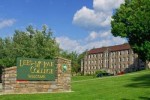
We have ranked the community colleges in the Raleigh and Cary area by the percent of students who either completed their degree or transferred to a 4-year institution. Lees - McRae College in Smithfield, NC ranked as the #1 community college in this area. Visit their official website at http://www.lmc.edu
Lees - McRae College Highlights
- Serving students from Smithfield and surrounding areas
- 73% of students either graduated or transferred to a 4-year college/university
- Tuition & fees are $28,000 per year
Top Community Colleges in Raleigh and Cary
| Rate | Institution Name | Location |
|---|---|---|
| 73% | Lees - McRae College | Smithfield, NC |
| 43% | Warren Wilson College | Raleigh, NC |
Community Colleges in Greensboro, High Point
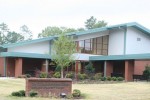
We have ranked the community colleges in the Greensboro and High Point area by the percent of students who either completed their degree or transferred to a 4-year institution. Richmond Community College in Asheboro, NC ranked as the #1 community college in this area. Visit their official website at http://www.richmondcc.edu
Richmond Community College Highlights
- Serving students from Asheboro and surrounding areas
- 54% of students either graduated or transferred to a 4-year college/university
- Tuition & fees are about $2,600 per year for state residents ($9,100 for out of state)
Top Community Colleges in Greensboro and High Point
| Rate | Institution Name | Location |
|---|---|---|
| 54% | Richmond Community College | Asheboro, NC |
| 48% | Halifax Community College | Jamestown, NC |
| 44% | Rowan - Cabarrus Community College | Wentworth, NC |
Community Colleges in Durham
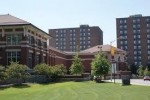
We have ranked the community colleges in the Durham area by the percent of students who either completed their degree or transferred to a 4-year institution. East Carolina University in Durham, NC ranked as the #1 community college in this area. Visit their official website at http://www.ecu.edu
East Carolina University Highlights
- Serving students from Durham and surrounding areas
- 89% of students either graduated or transferred to a 4-year college/university
- Tuition & fees are about $7,600 per year for state residents ($24,700 for out of state)
Top Community Colleges in Durham
| Rate | Institution Name | Location |
|---|---|---|
| 89% | East Carolina University | Durham, NC |
| 50% | Pitt Community College | Roxboro, NC |
Community Colleges in Winston, Salem

We have ranked the community colleges in the Winston and Salem area by the percent of students who either completed their degree or transferred to a 4-year institution. Davidson College in Thomasville, NC ranked as the #1 community college in this area. Visit their official website at http://www.davidson.edu/
Davidson College Highlights
- Serving students from Thomasville and surrounding areas
- 91% of students either graduated or transferred to a 4-year college/university
- Tuition & fees are $55,800 per year
Top Community Colleges in Winston and Salem
| Rate | Institution Name | Location |
|---|---|---|
| 91% | Davidson College | Thomasville, NC |
| 56% | Gardner - Webb University | Winston-Salem, NC |
Community Colleges in Asheville
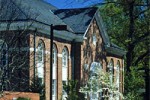
We have ranked the community colleges in the Asheville area by the percent of students who either completed their degree or transferred to a 4-year institution. Barton College in Asheville, NC ranked as the #1 community college in this area. Visit their official website at http://www.barton.edu/
Barton College Highlights
- Serving students from Asheville and surrounding areas
- 55% of students either graduated or transferred to a 4-year college/university
- Tuition & fees are $33,300 per year
Top Community Colleges in Asheville
| Rate | Institution Name | Location |
|---|---|---|
| 55% | Barton College | Asheville, NC |
| 40% | Brevard College | Flat Rock, NC |
Community Colleges in Hickory, Lenoir, Morganton
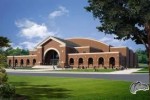
We have ranked the community colleges in the Hickory, Lenoir, and Morganton area by the percent of students who either completed their degree or transferred to a 4-year institution. Campbell University Inc in Hudson, NC ranked as the #1 community college in this area. Visit their official website at http://www.campbell.edu/
Campbell University Inc Highlights
- Serving students from Hudson and surrounding areas
- 91% of students either graduated or transferred to a 4-year college/university
- Tuition & fees are $36,400 per year
Top Community Colleges in Hickory, Lenoir, and Morganton
| Rate | Institution Name | Location |
|---|---|---|
| 91% | Campbell University Inc | Hudson, NC |
| 54% | Central Carolina Community College | Hickory, NC |
| 50% | Wilkes Community College | Morganton, NC |
Community Colleges in Rocky Mount

We have ranked the community colleges in the Rocky Mount area by the percent of students who either completed their degree or transferred to a 4-year institution. North Carolina A & T State University in Rocky Mount, NC ranked as the #1 community college in this area. Visit their official website at http://www.ncat.edu
North Carolina A & T State University Highlights
- Serving students from Rocky Mount and surrounding areas
- 76% of students either graduated or transferred to a 4-year college/university
- Tuition & fees are about $7,000 per year for state residents ($21,200 for out of state)
Top Community Colleges in Rocky Mount
| Rate | Institution Name | Location |
|---|---|---|
| 76% | North Carolina A & T State University | Rocky Mount, NC |
| 72% | Elizabeth City State University | Tarboro, NC |
Community Colleges in New Bern
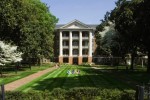
We have ranked the community colleges in the New Bern area by the percent of students who either completed their degree or transferred to a 4-year institution. William Peace University in Grantsboro, NC ranked as the #1 community college in this area. Visit their official website at http://www.peace.edu
William Peace University Highlights
- Serving students from Grantsboro and surrounding areas
- 73% of students either graduated or transferred to a 4-year college/university
- Tuition & fees are $33,300 per year

Top Community Colleges in New Bern
| Rate | Institution Name | Location |
|---|---|---|
| 73% | William Peace University | Grantsboro, NC |
| 54% | Davidson County Community College | New Bern, NC |
Other Community Colleges in North Carolina
The table below lists all the other community colleges in North Carolina that do not belong to any large metropolitan or urban concentrated area. The table also displays the "Rate" column, which is the percent of students completing course work.
The tuition information displayed is an estimate, which we calculated based on historical data and should be solely used for informational purposes only. Please contact the respective school for information about the current school year.
Source: IPEDS Survey 2012-2020: Data obtained from the US Dept. of Education's Integrated Postsecondary Education Data System (IPEDS). Data may vary depending on school and academic year.